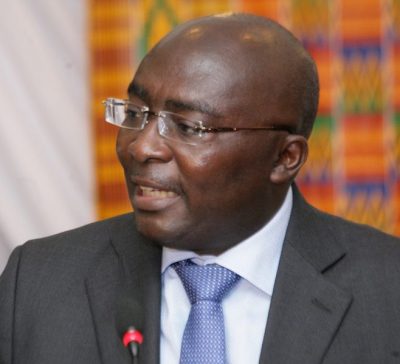Vice President Mahamudu Bawumia, addressing a Town Hall on the economy, Wednesday, said virtually all the economic indicators are posting positive results – a stable macro-economic environment to support an inclusive transformation agenda to ensure social equity.
The performance of the fundamentals, including the inflation rate, gross debts, Gross Domestic Product (GDP) growth, he said, were comparatively better under the current Administration than under the previous National Democratic Congress (NDC).
Giving the rates of the performance of the cedi over those two periods, the Vice President said: “The worst performance of the cedi so far, is better the best under the NDC”.
He stated that the positive fundamentals were a reflection of the prudent measures being implemented by the Ministry of Finance and Central Bank towards changing the structure of economy.
Dr. Bawumia’s response comes after various groups and individuals have sought answers as why the currency was depreciating against other major currencies, especially the US dollar. The Vice President in 2014 delivered a lecture where he accused the John Mahama-led administration of incompetence in managing the economy as a result of the depreciation of the cedi. “If the fundamentals are weak, the exchange rate will expose you” he said during the lecture in 2014.
But at the maiden Town Hall meeting to enable the Economic Management Team (EMT) answer questions on the performance of the economy from representatives of civil society organisations, academia and members of the public, Dr. Bawumia stated that: “If the fundamentals are weak the exchange rate will expose you but it is a warped logic to jump from that to a conclusion that if there is depreciation in your currency then the fundamentals must be weak… it is very warped logic,”
According to the Vice President, at the end of January 2019 as part of the seven prior actions to get to the IMF board and the completion of the IMF programme, the Bretton Woods Institution gave Ghana seven actions to complete before March 15.
He said it was as a result of this that the Ghana cedi hit an all-time low recording a rate of GH¢5.86 to $1.
However, the cedi has since recorded some marginal appreciation closing at around GH¢5.56 against the dollar as of March 15, 2019.
“The most important and the proximate cause of the recent depreciation is the time inconsistency of an IMF prior action on the reserves target.
“One of the conditions that the Bank of Ghana had to meet was to increase its net international reserves to the level of December 2018. To increase the net international reserves, however, meant that the Bank of Ghana could not sell any foreign exchange in the market. They had to essentially hold their hands to the back and could not intervene on the market during this particular period.”
“So demands for foreign currency was not met by supply as normally happens on a day-to-day basis, and we know when the demand is greater than the supply or the supply is not coming, the price will go up and this is exactly what was happening,” he said.
Denying claims that the Bank of Ghana used about $800 million to shore up the economy to save the cedi, Dr Bawumia said “the market corrected itself. Investor sentiments acknowledged that the fundamentals are much stronger than expected… That would not make sense.”
Vice President Bawumia chairs the EMT, with Mr Yaw Osafo-Maafo, the Senior Minister, is the Vice Chairperson.
The others are Mr John Peter Amewu Energy Minister; Mr Ken Ofori-Atta, Finance Minister; Mr Alan Kwadwo Kyerematen, Minister of Trade and Industry; Dr Owusu Afriyie Akoto, the Minister of Food and Agriculture; Professor George Gyan-Baffour, Minister of Planning; and Dr Anthony Akoto Osei, Minister of Monitoring and Evaluation. Professor Amoako Tuffuor is the Secretary to the EMT.
Before the Vice President’s address, Prof. Amoako Tuffuor explained the role of the EMT.
He indicated that the EMT engages with key stakeholders, implements government policies and offers solutions to socio-economic challenges.







